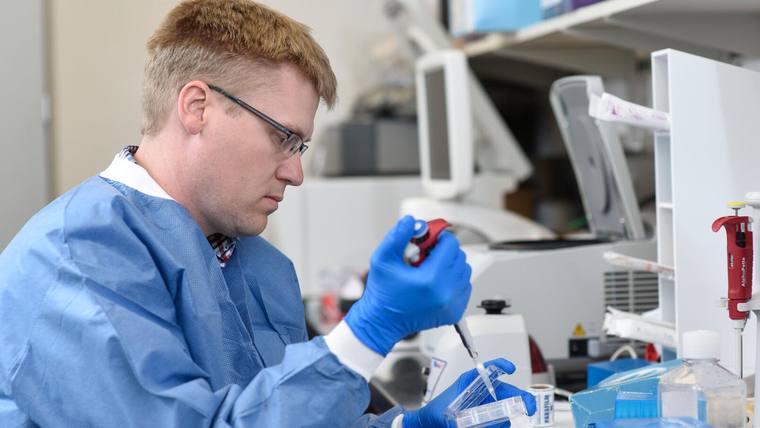-
Science Saturday: Engineering tissue to strengthen underdeveloped hearts

Could cells taken from a small patch of skin become heart muscle and repair a rare congenital heart defect? It's a scientific question that Timothy Nelson, M.D., Ph.D., and collaborators hope to answer for those born with an underdeveloped left heart chamber — a rare, complex condition known as hypoplastic left heart syndrome (HLHS).
Discovering the first cell-based therapy to rebuild heart tissue for HLHS has been a decade-long research passion for Dr. Nelson, who is the director of the Todd and Karen Wanek Family Program for Hypoplastic Left Heart Syndrome at Mayo Clinic.
"The problem is that the majority of complex single ventricle patients born with congenital heart defects, like HLHS, are going to eventually develop heart failure. Unfortunately, heart transplantation is less than ideal for this patient population, that can include children with complex comorbidities, even if there wasn’t a severe shortage of suitable organs," says Dr. Nelson. "Mayo Clinic research plays an important role in advancing innovative discoveries for rare and complex heart conditions to expand options."
Remuscularizing the heart
Approximately 10,000 people in the U.S. are living with HLHS — a condition that severely weakens the heart. Surgery to reposition arteries enables a single ventricle to pump blood to the lungs and the rest of the body, but that restores only a portion of circulatory function. While advancements are being made, few people with HLHS live past the age of 30.
"HLHS is essentially like taking your lawn mower engine and putting it into your SUV and driving to work at 70 miles an hour every day," says Dr. Nelson. "Our research is trying to understand if we can convert defective hearts from a 5-horsepower engine to a 50-horsepower engine. We probably will never make it into the 100-horsepower engine that a normal heart is, but our goal is to make the heart bigger and stronger."
Current technologies in clinical studies, such as cord blood and bone marrow, which Dr. Nelson calls "fertilizer," can be injected into the heart muscle during planned surgeries and may be useful to preserve and protect the heart muscle. Ultimately, this has limited therapeutic value after the onset of heart failure.
"Fertilizer approaches may stimulate the heart to grow the best it can. That doesn't get us to the finish line most of the time because the fertilizer by itself just isn't able to grow it big enough and strong enough," says Dr. Nelson.
In search of new options, Dr. Nelson's research team is investigating whether a bioengineered heart product could regenerate the patient's own heart tissue and repair the underdeveloped part of the heart — essentially remuscularizing the heart.
From patch of skin to a heart cell
Research into heart tissue regeneration begins with a biopsy of the patient's skin the size of a pencil eraser. Cells are extracted and then reprogrammed to become induced pluripotent stem cells, which is like turning back the clock in time to when cells were first forming in the womb. At that state, the cells are dividing and capable of becoming any type of cell in the body. In this case, they are then trained to become heart cells, known as cardiomyocytes. They become beating, contracting heart muscle cells.
It is a nine-month process from cell extraction to the scale up of the hundreds of millions of cells that would be needed to test whether they could form new heart tissue.
"We have reprogrammed these cells in the lab and tested them in multiple preclinical models where we observed them engrafting into the heart muscle of the recipient, then they grow, divide and expand," says Dr. Nelson. "We are now interested in learning whether these cardiomyocytes could regenerate heart tissue in humans."
Dr. Nelson's decade-long circuitous research path has led to an important nexus. The Food and Drug Administration will permit the team to study the safety of induced pluripotent engineered heart cells in a phase 1 trial at Mayo Clinic for adults with congenital heart defects.
The HLHS Consortium, comprised of multiple cardiovascular hospitals across North America, was founded at Mayo Clinic and provides a team approach to conduct large-scale studies for complex congenital heart disease patients. The HLHS Consortium works together to advance scientific knowledge and practice for rare congenital heart disease.
This important work — to repair, replace or restore diseased cells, tissue or organs — is associated with regenerative medicine. Mayo Clinic's Center for Regenerative Biotherapeutics supports HLHS research through distributing and expanding the network of scientists and researchers utilizing these tools at the Regenerative Medicine Biotrust.
This HLHS research milestone at Mayo is made possible, in part, by collaboration with Mayo Clinic Ventures to license the technology to a nonprofit organization that will be sponsoring the clinical trial. The nonprofit organization, HeartWorks, and its staff of 20 have worked with Mayo Clinic’s program for HLHS to co-develop technology that will be tested. The research is also supported by the generosity of the Todd and Karen Wanek Family.
Depending on the outcome of the phase 1 safety study, it could take years before engineered heart tissue is approved for use in daily clinical care for congenital heart disease.
About Dr. Nelson
Dr. Nelson graduated with degrees in biochemistry and molecular biology from the University of Wisconsin Eau Claire and Platteville. He completed the Medical Scientist Training Program at the Medical College of Wisconsin, followed by a research fellowship and residency at Mayo Clinic. He has additional training in cardiovasology through the National Institutes of Health.
Research by Dr. Nelson:
Stem Cell Therapy and Congenital Heart Disease
###








